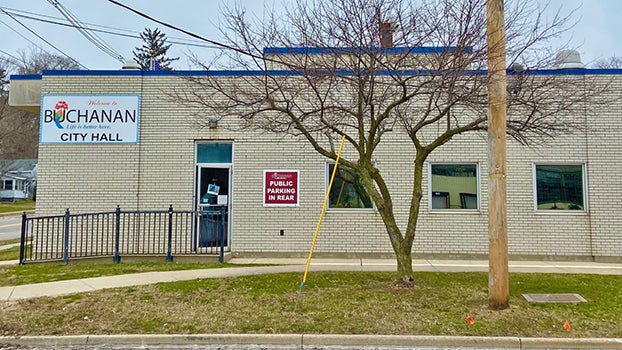Dobrich wraps up year at top
Published 10:31 pm Tuesday, September 7, 2010

Cass Probate Judge Susan Dobrich
By JOHN EBY
Dowagiac Daily News
CASSOPOLIS — As Cass County Probate Judge Susan L. Dobrich nears the end of her presidency of the 103-member Michigan Probate Judges Association, she reflected Tuesday afternoon on her term.
Come Oct. 1, the job she inherited from Monroe shifts from Cassopolis to Cadillac and successor Ken Tacoma.
Before then, however, comes her six-page president’s report to the Michigan Probate Judges Association for MPJA’s Sept. 16 conference in Grand Rapids.
Dobrich, Cass County’s first female prosecutor, has been a judge for 15 years, succeeding Herbert E. Phillipson Jr. in 1995.
“We have no executive director, so we do our own work among ourselves” — much of it by e-mail, said Dobrich, adding, “It’s a lot more work than I ever dreamed it would be.”
“We identify issues, we lobby, we advocate for children and for our positions,” such as her remarks Aug. 19 to the Cass County Board of Commissioners enlisting its support in opposition to public per diem, a state “scheme” to shift costs back to the local level.
“Our interests are very closely aligned,” Dobrich said, which is ironic.
“I was much more friendly with the state when I first became a judge,” Dobrich said, “than I was with the county Board of Commissioners. But over time, our issues are almost always identical. We’re pretty much in agreement.”
Dobrich compared organizing the conference to planning a wedding.
In her farewell remarks she will thank her staff and husband for “being supportive and tolerant.”
“My husband is looking forward to Oct. 1, when I have made a promise that I will quit reading my e-mails on my BlackBerry in the evening and focus on other matters,” she said of Tom Atkinson, who administers Dowagiac’s police and fire departments as public safety director.
Large counties with multiple judges tend to produce MPJA leaders.
“I’m in the middle of things and know what’s going on in county government,” which benefits Cass County, she said.
“We do get something tangible by having someone in the lead position of knowing the legislation — what’s going to affect us, how much it’s going to cost and how to stop some of these cost-shifting measures the State of Michigan’s trying to take.”
Dobrich, who has two years remaining on her six-year term — Circuit Judge Michael Dodge is up for re-election this November — is responsible as president for assembling agendas for quarterly MPJA meetings. District Judge Stacey Rentfrow was elected in 2008.
Dobrich will conclude her year as MPJA president with nine reports to her colleagues.
She has also worked closely with the MJA (circuit judges) and the MDJA (district judges), such as a State Bar task force on how to restructure the courts.
“The three associations are getting closer because we know we need each other,” she said. “Especially because there’s so much crossover with probate judges doing circuit cases. I’m the elected probate judge who’s also assigned to the circuit court division of family court.”
One issue is the DHS budget.
The proposed fiscal year (FY) 2010-11 Department of Human Services appropriation includes language “that could significantly alter the way foster care services are financed.”
Both county-supervised foster care cases and state-supervised foster care cases can be administratively supervised by either the local DHS or by a contracted private agency with DHS.
Currently, foster care administrative costs are paid as follows:
• State and court wards supervised through local DHS offices have their own administration paid by the state. Counties do not contribute to this administrative cost.
• For state courts supervised by contracted private agencies, the state pays 100-percent of the administrative per diem allocated to private agencies — $37 per day.
• For court wards supervised by contracted private agencies, counties pay half of the administrative per diem and the state foots the remaining 50 percent. Each payment amounts to $18.50.
Dobrich said the proposed changes under Senate Bill 1158 would make major change in the systems which would require that a new per diem charge of $40 would be imposed upon counties for court wards who are administered through the local DHS office.
“The cost for the counties is astronomical,” she says, “and estimated to be $4.8 million.” Dobrich and six others worked on a subcommittee on the political side of this issue. The proposed budget has now been sent to conference committee.
Another issue is LEIN, the Law Enforcement Information Network.
“LEIN has been a huge issue,” she said.
“The state police are trying to ding all the local county agencies” for revenue.
“Prosecutors, sheriffs and the courts have taken the position that this is a county issue. I am required to have certain things entered on LEIN because the law says so, such as a PPO (personal protection order), even though I don’t have the ability to access it. They are charging me $700 for the privilege of doing my job. Some of us have not paid and they’ve been writing us letters.”
Dobrich said judges let MAC (Michigan Association of Counties) “take the lead on this issue, since it really is a county issue, given that they pay for the cost for the courts and law enforcement. The Michigan Treasury began collecting against counties that had not paid their LEIN fees, and the Treasury has now agreed to stop collections until Sept. 16, giving all the parties an opportunity to find a solution. If a solution is reached by Sept. 16, MAC may encourage its members to pay their current outstanding LEIN fees. There are still unanswered questions, chief of which is whether the county monies that the Treasury garnishes will be repaid.”
Dobrich said “what is most needed” is reinstatement of the policy council — “hopefully, a priority under a new governor.”
A “simple question” of how long the MPJA has existed “resulted in significant e-mail traffic” and ultimately resulted in the appointment of an historian.






